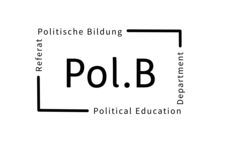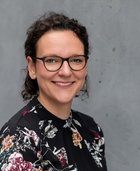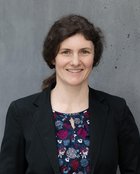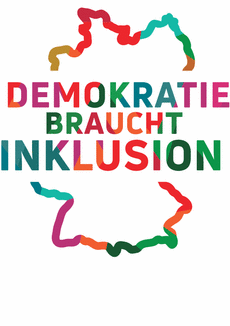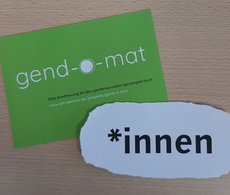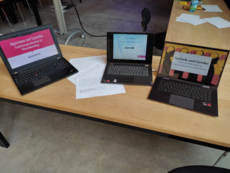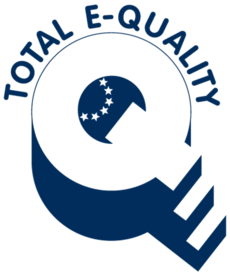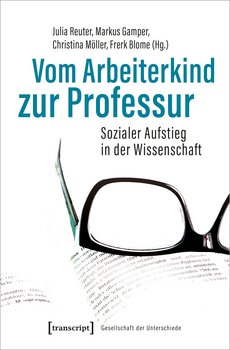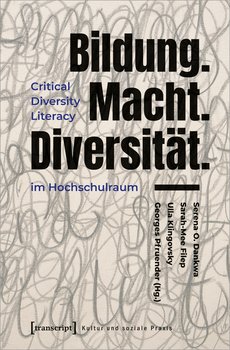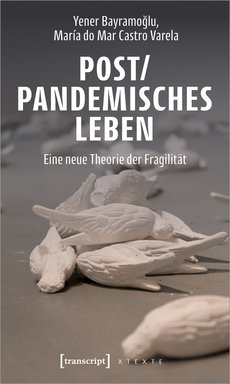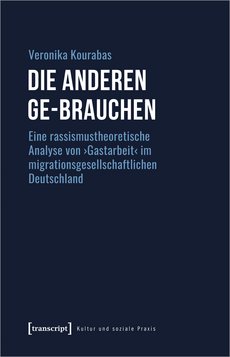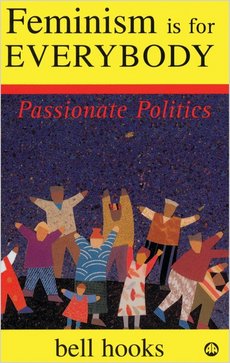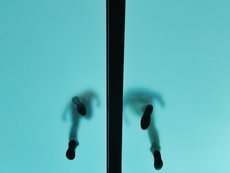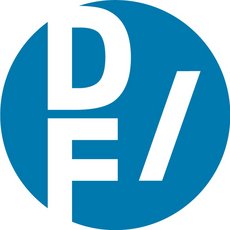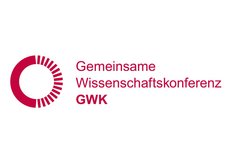
Für die deutschsprachige Version des Newsletters, bitte hier klicken.
Dear readers:
we wish you a healthy, happy and optimistic new year! In addition to the current topics of our issue, we would like to give you an outlook on what will be important in 2022 from the points of view of the Equal Opportunity Officer and the Diversity Officer:
Audit »Vielfalt gestalten«: After intensive discussions in the various working groups last year, we will meet in the spring for a university-wide audit workshop. We will announce the exact date closer to the event. All university members are cordially invited to participate.
Professorinnenprogramm III: During the approval period, we were able to submit two successful applications for funding for appointed female professors — this means that the university will have around one million euros available for additional measures to promote equality for women until 2026. We will invest this money in additional scholarships, an equalisation fund for women with committee duties, a publication fund, measures aimed at increasing family-friendliness as well as coaching and mentoring programmes for female scientists and artists. Below you can find the first calls for applications for these funding programmes.
Digital accessibility: For the subject of accessibility, the Diversity Department has received personnel support through the HSP funds »Inclusive Universities Thuringia.« Now we working specifically on the implementation of a digital orientation system and on a barrier-free design for the website of the Bauhaus University Weimar.
Working conditions in science: Under the hashtag »IchbinHanna,« young scientists made themselves heard and criticized the working conditions in the German university system. From a diversity and equality perspective, it is also important to improve the systemic framework conditions for different groups of people and life models in order to counteract structural disadvantages. We are involved in various working groups and initiatives to this end.
Decentralized equal opportunity plans: The faculty’s equal opportunity plans will be finalized in the summer semester and then presented to the Senate. This means that an important goal from the central equal opportunity plan has been achieved: anchoring gender competencies and responsibilities in more decentralized ways. We would like to thank the decentralized equal opportunity representatives and the members of the faculties’ respective working groups.
Appointment procedures: A number of appointment procedures will again take place in 2022. Since appointment procedures have a direct impact on the proportion of women at the university, they represent an important strategic goal for gender equality work. We will therefore continue to expand the proactive approach to recruiting qualified female candidates. Moreover, we will place a special focus on implementing the procedures in equitable as well as and gender- and diversity-conscious ways.
Selection Committee President: The Equal Opportunity and Diversity Officers are advisory members of the committee selecting the next university president, which will start its work in February. You are welcome to send us suggestions for suitable candidates to whom we should forward the call for applications once it has been released.
Counseling services: We would like to draw your attention to our counseling services — for instance, the new open office hours of the diversity officer and the equal opportunity officer at M18 or online — and encourage you to contact us with your questions, critiques, or suggestions!
We look forward to tackling these challenges and opportunities together with you in 2022!
Best regards,
Tina Meinhardt
Equal Opportunity Officer of the Bauhaus-Universität Weimar
Dr. Miriam Benteler
Diversity Officer of the Bauhaus-Universität Weimar
Equal Opportunity Advisor
Dr. Michael Wallner
Equal Opportunity and Diversity Advisor
Franziska Fritsch
Equal Opportunity Office Administration
INTRODUCTION
In July 2021, Galyna Sukhomud (M.Sc. European Urban Studies, Faculty of Architecture and Urbanism, fifth semester) was elected as one of two Student Representatives to the Bauhaus-Universität Weimar's Equal Opportunity Advisory Board. Since October 2021, she has been serving as a contact person for students from all faculties on the topic of gender equality at our university. In this position, she also acts as a spokesperson for students, bringing their suggestions and criticism to the Equal Opportunities Advisory Board.
We are pleased to introduce Galyna Sukhomud with a short interview here.
Since January 1st, 2022, Dr. Elizabeth Watts and Timo Buhl have been supporting the Diversity Department as part of the »Inclusive Universities Thuringia« programme.
Dr. Elizabeth Watts has been working at the Bauhaus-Universität Weimar’s Language Center since 2015. Moreover, as a post-doc in biology didactics, she has worked intensively on the topic of inclusive science education and the development of corresponding offers for teacher training in recent years.
Timo Buhl completed his studies in visual communication at the Bauhaus University in Weimar in 2020. After his studies, he worked as a media designer in an inclusive company in the field of digital accessibility. As a freelancer, he designs and conducts workshops for people with disabilities on the topic of digital media.
Both are now working together on the implementation of a digital and analogue orientation system for the Bauhaus-Universität Weimar as well as on the design of training courses for barrier-free event planning.
The Student Government (StuKo) Department »pol.B« introduces itself:
»Pol.B is the StuKo department for political education. We offer a regular exchange among students on international political issues, lectures, books and films. We want to engage more students in political action by organizing and participating in demos, painting banners, writing speeches, and establishing a direct dialogue between students and the university administration. Pol.B aims to contribute to political thinking and empowerment within and beyond Bauhaus-Universität Weimar and to counteract various forms of discrimination, especially taking into account the diversity of the student body.«
For more information about the Student Government (StuKo) Department »pol.B« and how to participate, please click here.
»Arbeiterkind.de« is an organization that advocates for equal opportunities in the area of education all across Germany. Its 6.000 members, organized in 80 local chapters, inform and support students from families without experiences of higher education, from the start of their university studies to their career entries.
The goal of »Arbeiterkind.de« is to motivate first-generation students to enroll at a university and to work against the underrepresentation of persons with non-academic family backgrounds. Through personal mentoring, the exchange of experiences on topics such as students financing, informational events at high schools and universities, an online-portal with information, and its own social network, »Arbeiterkind.de« works promotes educational equality.
Here, the local chapter — »Arbeiterkind.de Weimar« — introduces itself.
CURRENT ISSUES
Do you have any questions about equal opportunity or diversity work at the university? Do you need advice, or do you have any suggestions for us? — Since November 2021, Tina Meinhardt, Equal Opportunity Officer at the BUW, and Miriam Benteler, Diversity Officer at the BUW, have been offering open consultation hours at the conference room of M18 (Marienstraße 18). Due to the current Corona situation, however, the consultation hours are currently taking place online (see below for BBB-links).
Consultation hours of the Equal Opportunity Officer:
every second Wednesday of the month, noon – 1pm
In conversation with Tina Meinhardt, you can discuss equal opportunity issues, learn more about ways to balance work/studies and family obligations, make suggestions, and pass on criticism.
You can also use the consultation hours to seek advice regarding specific measures for the advancement of women or regarding cases of sexualized discrimination or violence.
Here is the BBB-link for online consultations with Tina Meinhardt.
Consultation hours of the Diversity Officer:
every second Wednesday of the month, noon – 1pm
Please stop by if you would like to make suggestions or discuss diversity and anti-discrimination measures at the university with Miriam Benteler. During consultation hours, you can also receive advice in cases of discrimination or unfair treatment.
Here is the BBB-link for online consultations with Miriam Benteler.
All consultations are strictly confidential; advice and support are offered in accordance with the affected persons’ individual wishes, needs, and goals.
To highlight the university's collection of queer-feminist literature, the library has put up a special »queer lit« shelf display for the duration of the 2021–22 winter term. Every month, the exhibition moves to another library floor and subject area to illustrate the interdisciplinary character of queer-feminist debates — from politics over art and design to urban planning. Besides (queer-)feminist manifestos and reference books, the »queer lit« shelf also presents novels with queer plots and characters. Since new titles are constantly being added to the exhibition, all books on display can be checked out immediately.
The »queer lit« project also aims at increasing the visibility of queer-feminist literature more generally by providing a platform for the experiential knowledges and scientific perspectives of members of the diverse LGBTQIA+ (Lesbian, Gay, Bisexual, Trans, Queer, Intersex, Asexual/Aromatic) communities and of WLINTA (Women, Lesbians, Intersex, Non-binary, Trans, Agender people) in particular.
The »queer lit« project was initiated and organized by students from the Bauhaus-Universität Weimar, in collaboration with the CatCalls of Weimar collective and the university library. You can follow the project on Instagram.
Thanks to funding from the »Inklusive Hochschulen Thüringen« programme, the Bauhaus-Universität Weimar has been able to start implementing measures from the university’s plan of action for the UN Convention on the Rights of Persons with Disabilities. The plan is made up of 30 measures, including making buildings and communal spaces accessible and raising awareness.
Funding from the »Hochschulpakt« is being used in the following areas: Configuring accessible seminar rooms, establishing building accessibility, implementing accessible websites, and developing both an analogue and a digital navigation system. Workshops for students and staff, focussing especially on dealing with mental illness, will supplement these measures.
The Diversity Department is coordinating the implementation of the »Bauhaus-Universität Weimar Plan of Action for the UN Convention on the Rights of Persons with Disabilities« and is working closely together with the Representative for Individuals with Disabilities, the Representative for the Needs of Students with Chronic Illnesses and Disabilities, University Communications, and the Service Centre for Facility Management.
DID YOU KNOW?
In December 2021, the Humboldt University of Berlin published a »Legal expertise on the assessment of the legal effectiveness of administrative forms of action when using the gender star or gender-inclusive formulations« (»Rechtliche Expertise zur Einschätzung der Rechtswirksamkeit von Handlungsformen der Verwaltung bei Verwendung des Gendersterns oder von geschlechtsumfassenden Formulierungen«). In this legal expertise for the German context, Prof. Dr. Ulrike Lemke (Public Law and Gender Studies, Humboldt Law Clinic Fundamental and Human Rights) investigates the effects of the use of gender-sensitive language, in particular the gender star, on the legal effectiveness and the binding claim of administrative forms of action. The result is, in short, that the use of gender-sensitive language cannot have any (negative) influence on the effectiveness or binding nature of administrative action, but rather increases its constitutional conformity.
SCHOLARSHIPS & FUNDS FOR WOMEN
In 2022, the Bauhaus-Universität will be awarding up to 2 »MINT/STEM* Scholarships for Female Master's Students«. With its MINT/STEM scholarships, the Bauhaus-Universität Weimar supports outstanding female master’s students from the Faculty of Civil Engineering and the Department of Computer Science and Media, who have demonstrated (or are expected to demonstrate) an outstanding performance or aptitude in their field.
The scholarship recipients are awarded € 450.00 per month for a period of 12 months, as well as non-material support in the form of the opportunity to participate in accompanying workshops. The scholarship begins in April 2022. The application deadline is 31 January 2022.
You can find more information about the MINT/STEM Scholarships on the Equal Opportunity Office's website »Internal funding programmes« or on the Bauhaus-Universität Weimar's website »Financing Opportunities«. For further financing opportunities, please visit the website »Scholarships and Funding«.
In 2022, the Bauhaus-Universität Weimar will be awarding one »Bridge Scholarship for Women Beginning Their Doctoral Studies«. This bridge scholarship is aimed at female early career researchers and artists in the transitional phase between a Master’s degree, Diplom or State Exam and a doctorate/PhD. It is intended to serve as startup funding for the development of a doctoral project.
The scholarship recipient is awarded €1,000.00 per month for a period of up to six months as well as non-material support in the form of the opportunity to participate in accompanying workshops. The scholarship holder is free to choose the funding period between 1 April 2022 and 31 March 2023.
The earliest deadline for applications is 31st of January 2022. Applications are possible on an ongoing basis at the latest until 31st of August 2022, depending on the awarding and the availability of funds.
You can find more information about the bridge scholarships on the Equal Opportunity Office's website »Internal funding programmes« or on the Bauhaus-Universität Weimar's website »Scholarships and Funding«. For further financing opportunities, please visit the website »Financing Opportunities«.
In 2022, the Bauhaus-Universität Weimar will be awarding one »Bridge Scholarship for Women Beginning A Habilitation or the Postdoc Phase«. This bridge scholarship is aimed at female early career researchers and artists in the transitional phase between a doctorate/PhD and a postdoctoral project/habilitation. It is intended to serve as startup funding for the development of a habilitation project or an academic or artistic postdoctoral project meeting high conceptual standards.
The scholarship recipient is awarded €2,000.00 per month for a period of up to six months as well as non-material support in the form of the opportunity to participate in accompanying workshops. The scholarship holder is free to choose the funding period between 1 April 2022 and 31 March 2023.
The earliest deadline for applications is 31st of January 2022. Applications are possible on an ongoing basis at the latest until 31st of August 2022, depending on the awarding and the availability of funds.
You can find more information about the bridge scholarships on the Equal Opportunity Office's website »Internal funding programmes« or on the Bauhaus-Universität Weimar's website »Scholarships and Funding«. For further financing opportunities, please visit the website »Financing Opportunities«.
As a measure to promote gender equality, the Equal Opportunity Office’s »Equalisation Fund« is financed by the Professorinnen-programm III (funding programme for female professors) of the German federal government and federal states for the period of 2022 to 2024. The »Equalisation Fund« should serve to lessen the workload of women who are junior professors, professors or scientific or artistic/creative employees who are involved in committees at the Bauhaus-Universität Weimar. The fund is also intended to provide additional incentives for women to become more involved in committees or in university or faculty management, so that gender parity can be established in the long-term in all university committees.
Applicants can apply for financial support for compensatory or career-promoting measures for their work in the following offices, bodies, advisory boards, commissions, or committees:
- Committees or offices of university or faculty management
- Other committees according to the Basic Regulations of the Bauhaus-Universität Weimar
- Advisory boards, commissions, or committees set up by the Presidential Board or the Senate
The applicants can decide for themselves on the exact use of the funds in terms of compensation or relief.
Application deadlines for 2022 are February 28, 2022 and October 31, 2022.
You can find more information on the Equal Opportunity Office’s »Equalisation Fund« here.
The Equal Opportunity Office's »Publication Fund« is aimed at early career female scientists and artists (i.e. women in doctoral programmes, post-docs, artistic/creative employees, and junior professors) in all faculties at the Bauhaus-Universität Weimar.
Applicants can apply for financial support for up to 2,500 euros (incl. MwSt.) from the fund. This funding can be used towards covering the costs of publishing their scientific or artistic/design work with a publishing house or independent publishing (i.e. without working with a publishing house).
Application deadlines for 2022 are February 28, 2022 and October 31, 2022.
You can find more information on the Equal Opportunity Office’s »Publication Fund« here.
The Equal Opportunity Office's »Congress Expense Fund« is entering the next round. The fund is aimed at female students, doctoral candidates and academic and artistic/creative employees of the Bauhaus University Weimar. Funding covers (parts of) the cost of conference fees and travel expenses and can be provided for:
(a) participation in a congress or event in Germany or abroad/ participation in online conferences for which the applicant has successfully submitted a piece of work, lecture, poster presentation or paper. The maximum funding amount is 500 euros per application.
(b) attending a congress or event in Germany or abroad/ attending online conferences without making a contribution, if this demonstrably serves the further professional development of the applicant. The maximum funding amount is 200 euros per application.
The official call for applications and online application form will be provided soon. Applications through the online system are expected to be possible after Feb. 14th.
The application deadline is March 31 2022.
More information can be found here.
The Equal Opportunities Office's »Women's Promotion Fund« is also entering the next round. The fund is aimed at students, doctoral candidates and academic or artistic/creative employees of the Bauhaus-Universität Weimar.
On the one hand, the »Women's Promotion Fund« serves to promote early career female scientists: Measures which enable female academic employees or doctoral students to gain further qualification can be supported with a maximum amount of €1,000 (Funding Line I). Projects by female students can be funded with a maximum amount of €500 per project (Funding Line II).
On the other hand, the »Women's Promotion Fund« serves to support projects aimed at increasing the proportion of women in STEM courses and/or enhancing the principles of gender mainstreaming in teaching and research: Projects which increase the percentage of female students in scientific-technical courses of study can be funded with a maximum amount of €2,000 per project (Funding Line I). Projects of female professors or academic employees which advance gender research or integrate gender-related aspects in study, teaching or research can be supported with a maximum amount of €2,000 per project (Funding Line II).
The official call for applications and online application form will be provided soon. Applications through the online system are expected to be possible after Feb. 14th.
The application deadline is March 31 2022.
More information can be found here.
ANNOUNCEMENTS
How and why does the German Research Association (DFG) promote gender equality? What concrete measures and funding procedures do exist? What should applicants know about these procedures?
In an online information session (in German language), the DFG will provide an overview of equal opportunity work, particularly as it relates to the DFG’s own gender equality measures. Focus topics of the info session are, amongst others:
- Maternity leave replacements, parental leave, and contract extensions due to times of absence
- Grants for equal opportunity measures
- Family allowances through the Emmy Noether Programme
- Budget for speakers
- Corona and gender
- Prospects for diversity work
- etc.
For more information about the workshop and how to participate, please click here.
DOCUMENTATION
Ludwig Lorenz (Bachelor's program Media Studies) and Sophie Grimme (graduate of the Master's program Human Computer Interaction) have created an online tool for visualizing the »Bison« portal’s course catalogue. It offers students and other interested parties a better overview of the Bauhaus-Universität Weimar’s course offer and networks among teachers and lecturers. The online-tool »BisonWatch« originated in the summer term 2021 as a final project for Prof. Dr. Bernd Fröhlich’s (Virtual Reality and Visualization Research, Faculty of Media) course »Visualization«. Here you can learn more about »BisonWatch«.
In the Winter term 21/22, the Bauhaus-Universität Weimar is offering the Bauhaus.Module »Technik und Gender« (»Technology and Gender«). Participants of the course are engaging with the interaction of gender knowledges and technological science/engineering.
The first few sessions dealt with foundational terms and debates within the field of gender studies. The upcoming sessions, which are divided into three subject areas — Gender and Biologie, Gender and Technology, as well as Practical Cases Studies — will provide participants with ample space to deepen their understandings of the subject matter, and to reflect on and widen their personal perspectives.
The class sessions, which are enriched by group work and group presentations, allow for an active exchange of ideas and valuable discussions. To pass the course, each participant is expected to finish a project that revolves around a self-developed question relating to the interplay of technology and gender.
The Bauhaus.Module is offered under the patronage of the Professorship for Human-Computer Interaction and taught by Britta Schulte (Faculty of Media Studies) and Christin Sirtl (Faculty of Engineering). The students are enrolled in the STEM-programs of both faculties.
The Bauhaus-Universität Weimar has been awarded with the »Total E-Quality-Prädikat« for a second time. Once again, the Bauhaus-Universität Weimar demonstrated a commitment to equal opportunities for the [binary] sexes and did so in an exemplary manner as part of its employee and organisational policies.
The jury justified their decision by stating that: »The Bauhaus-Universität Weimar is taking encouraging steps and is well on its way to establishing long-term equality in its organisational culture. Significant steps towards this goal have been taken in recent years at various levels«. The adopting of the Guidelines for protection against discrimination pursuant to the General Equal Treatment Act, professionalising gender equality representatives, collecting resources to proactively recruit women and the continued exemplary »Professorinnenfonds« initiative were explicitly referred to. Special attention was also paid to the successful submission under the »Professorinnenprogramm«, which was awarded with »Gleichstellung ausgezeichnet«.
The »Total E-Quality-Prädikat« is based on voluntary self-assessments and is awarded to private organisations and academic institutions. It recognises long-standing commitment to creating equal opportunities and has been awarded annually since 1997 by »Total E-Quality Deutschland« with support from the Federal Ministry for Family Affairs, Senior Citizens, Women and Youth. The association was founded in 1997 by representatives from major German companies and the support of the Federal Ministry of Education and Research and the Federal Ministry for Family Affairs, Senior Citizens, Women and Youth.
LITERATURE TIPS (PRINT)
»There are still significant barriers to educational advancement — to this day, only a minority of professors have a working-class background. What does the achievement of a professorship mean to these climbers? How do they experience the university and the promise of equal opportunities? And how did their own personal experiences of climbing the social ladder influence their scientific personas?
In this book, professors from various academic disciplines talk for the first time about their ›transgression of class boundaries‹ and the linkages between social background and academia. Their personal accounts are framed by selected contributions from the field of inequality studies by — amongst others — Christoph Butterwegge, Michael Hartmann and Andrea Lange-Vester.« (Translation of publisher’s announcement)
To visit the publisher’s website for the book Vom Arbeiterkind zur Professur please click here.
»Diversity is understood to be an ambivalent and polarising concept; is it a symbolic cover-up of neoliberal policies, which, as we know, tend to appropriate critical perspectives in order to disrupt their transformative power? Or is it a useful tool for raising questions of justice and articulating and financing demands for redistribution?
This anthology does not provide a ready answer to such questions, nor does it serve the (widespread) fiction that diversity is something that can be learned and implemented according to a manual. Fortunately rather, it thoughtfully, precisely, and context specifically debates the limits and potential of current diversity policies in education. The result is an exciting, clever, inspiring and poignant collection of analyses, experiments and reflections. The anthology shows through a broad range of perspectives how education itself is very much a part of and an enabler of a colonial, racism, hetero-cis-patriarchal, ableist and classist culture, but also offers suggestions for resistance and change.« (Translated excerpt from the anthology’s foreword by Prof. Dr. Patricia Purtschert, Interdisciplinary Centre for Gender Studies at the Universität Bern)
A free open-access pdf copy of the book can be found here.
»The coronavirus pandemic and the accompanying ›state of emergency‹ have provided an opportunity to question normativity, but also to look into the future. With their new theory of fragility, Yener Bayramoğlu and María do Mar Castro Varela make clear that, in terms of social justice, it should be less about accepting heterogeneous lifestyles and more about the paying attention to the accepted vulnerabilities that are structurally promoted and stabilised. Their approach brings together different perspectives from the fields of ethics, politics and art, and offers — among other things within the context of digitality, racism and solidarity — the possibility of changing how the pandemic is being evaluated.« (Translation of publisher’s announcement)
Click here to go to the publisher’s website for the German book Post/pandemisches Leben.
»›Guest labour‹ is not a closed chapter in Germany’s migration history and it continues to have an impact today. In her theory of race analysis, Veronika Kourabas employs the heuristic concepts of Ge-Brauch und Ver-Brauch to describe racism as a paradoxical relation of inequality. ›Guest labour‹ becomes in this way a tangible relationship of use and consumption that economically includes migrants, but at the same time excludes them through racially propagated discourse. This approach, in addition to the reconstruction of practices of resistance, opens up not only the analysis and critique of the past, but also the current dominant discourse on flight and migration.« (Translation of publisher’s announcement)
Click here to go to the publisher’s website for the German book Die Anderen ge-brauchen.
»›Simply put, feminism is a movement to end sexism, sexist exploitation, and oppression.‹ So begins Feminism is for Everybody, a short, accessible introduction to feminist theory by one of its most influential practitioners. Designed to be read by all genders, this book provides both a primer to the question ›what is feminism?‹ and an argument for the enduring importance of the feminist movement today.
Beginning with a broad survey of feminism's most important themes and concerns, bell hooks demystifies contentious concepts and turns apparent ideology into common sense. Providing a critical evaluation of the successes and failures of contemporary feminism, she looks at a wide variety of topics including reproductive rights, sexual violence, race, class and work. hooks encourages us to demand alternatives to patriarchal, racist and homophobic culture and thereby to seek out a different future.« (Publisher’s announcement)
Last December, bell hooks died at the age of 69. As an activist, scholar, and writer, she has spoken and written extensively about the interplay of racism, (hetero-) sexism and classism. If you'd like to learn more about the life and work of this icon of intersectional Black Feminism, you can watch this DemocracyNow report remembering bell hooks.
Click here to go to the publisher’s website for the book Feminism is for Everybody.
In October 2021, the Unrast Verlag published a German translation of the book, titled Feminismus für alle.
LITERATURE TIPS (ONLINE)
In her article for »University Affairs«, Julie Cafley, an expert on leadership in higher education, explores the reasons women are less likely to be appointed university president, and why so many have unfinished mandates.
The National Council of Women’s Organizations considers the coalition contract presented by the SPD, the Greens, and the FDP to be a success for women’s policy. According to the council, it aims at achieving equality between men and women in the current decade, and it also addresses many of the demands raised by the National Council of Women’s Organizations during the federal election.
Dr. Beate von Miquel, chair of the National Council of Women’s Organizations, emphasizes: »The fact that this coalition contract has such a strong gender equality profile is a big success, due not least to the many actors from civil society who have tirelessly fought for their issues and demands in recent months.«
The Joint Science Conference (GWK) has released its »25th Update to the Data (2019/2020) on Women in Higher Education Institutions and Non-academic Research Establishments« (German language only). The report shows once more that the proportion of female scientists has increased at both universities and non-university research institutes. However, in both areas, progress has been rather slow, and there is still urgent need for action.
On 28 October 2021, the German Research Association (DFG) presented the universities’ self-reports responding to the DFG’s »Research-Oriented Standards on Gender Equality 2020-2022.« Subsequently, the participating DFG members exchanged ideas and experiences in a workshop on »Equal Opportunities and Diversity« in the university context. In particular, the workshop dealt with measures to increase the proportion of women in the post-doc phase and the universities’ approaches to diversity. Here you can find a (German-language) summary of the workshop.
TV GUIDE
In her drama series, »I May Destroy You«, the British screen writer, producer, director, and actress Michaela Coel uses the medium of art to processes her personal experiences of sexual assault — sometimes in drastic, sometimes in funny ways: The show’s protagonist is Arabella, a writer who became famous through her debut novel »Chronicles of a Fed-up Millennial.« On a night out in London, she gets drugged and raped. In the following eleven episodes, the mini-series dissects a multitude of scenarios of sexual abuse. The show covers topics such as consent, stealthing, racism, complex victim-perpetrator-constellations, and revenge — an intense and profound work of art, which comes to life through its brilliant leading actress.
Available on Apple Itunes, Maxdome, Amazon, Google Play Movies, Sky Ticket, and Sky Go.
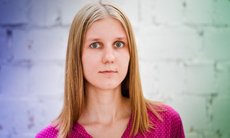
![Dr. Elizabeth Watts [Translate to English:] Porträtfoto von Dr. Elizabeth Watts vor einer grauen Betonwand: Sie hat lange, lockige, hellbraune Haare, braune Augen und trägt ein weißes, kurzärmeliges Oberteil mit buntem Muster am Kragen sowie ein Piercing im linken Nasenloch. Sie lächelt freundlich in die Kamera.](https://www.uni-weimar.de/fileadmin/_processed_/9/7/csm_Watts_Elizabeth_140x170_web_25bbdb047a.jpg)
![Timo Buhl [Translate to English:] Schwarz-weißes Porträtfoto von Timo Buhl vor einem weißen Hintergrund: Er hat kurzgeschorene, dunkelblonde Haare, einen Dreitagebart und trägt einen schwarzen Pullover sowie einen Ring im rechten Nasenloch. Er lächelt freundlich in die Kamera.](https://www.uni-weimar.de/fileadmin/_processed_/c/0/csm_Timo-Buhl_1689ff58a9.jpg)
